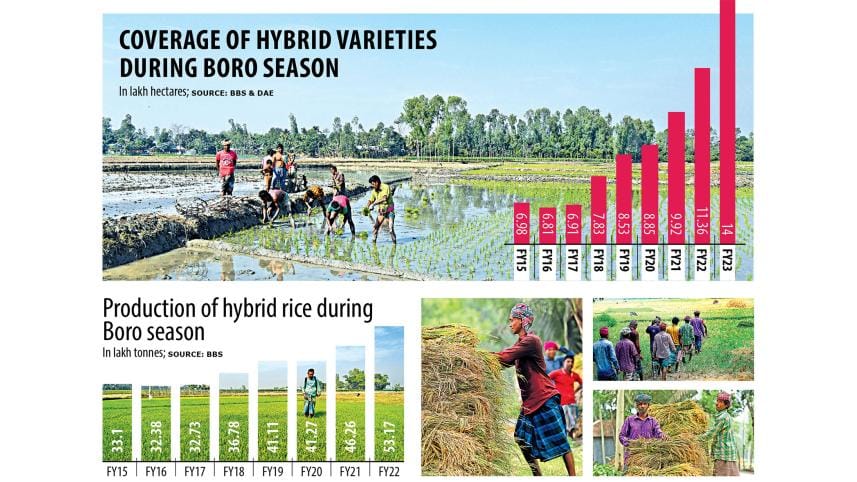Hybrid rice planted on record area

Farmers have planted hybrid rice on the highest amount of land in the current Boro season, the source of the biggest crop output, to profit from higher production and prices of the staple grain in the market.
Preliminary data of the Department of Agricultural Extension (DAE) showed that overall planting of Boro increased nearly 4 per cent to 49.99 lakh hectares of land in this cultivation season.
Of that, hybrid varieties of paddy cover 14 lakh hectares, the highest on record, which is nearly one-third of the total acreage of Boro.
On a year-on-year basis, the area being used for hybrid cultivation is 23 per cent higher from the 11.36 lakh hectares recorded by the Bangladesh Bureau of Statistics (BBS) in fiscal year 2021-22.
"We have really seen a good year. Most of the companies have had good business this year," said Humayun Kabir, managing director of Supreme Seed Company Ltd, a major seed seller.
This is the seventh consecutive year farmers have shown growing interest to increase land allocation for hybrid rice, a type of rice bred from two very different parents to bag a higher yield from a relatively smaller piece of land.
The scenario gradually changed since fiscal year 2015-16 when acreage of hybrid rice stood at 6.81 lakh hectares, according to the BBS.
In fiscal year 2021-22, farmers bagged 53 lakh tonnes of rice from the hybrid varieties during the Boro season, the harvests of which are made in the April-June period.
The amount was more than a fourth of that fiscal year's Boro season output of 2 crore tonnes. In terms of acreage, the area under hybrid cultivation was over one-fifth of the total land used during the Boro season.
Kabir of Supreme Seed said hybrid rice provides up to 20 per cent higher yield than inbred varieties if farmers properly follow cultivation practices. This is one of the major reasons for the increase in the planting of the varieties.
Besides, introduction of finer grain varieties of hybrid has attracted growers as finer grains enable better marketability than coarse grains, he said.
"The middle-income population prefers finer rice than coarse ones and companies have started introducing the varieties for the last five-six years," said Kabir, also general secretary of Bangladesh Seed Association.
During the early stage of hybrid rice cultivation in Bangladesh, Chinese varieties were introduced and the rice became sticky after boiling.
"Now the quality of hybrid rice is better. The amount of stickiness is low," he said, adding that these factors were encouraging growers to replace inbred rice.
Kabir said cost of cultivation of hybrid was not much higher than high yielding varieties. The cost of seed is higher, accounting for 10 per cent of the total cost, he said.
Farmers also need to apply more fertiliser, he said, adding that the agronomy, or the science of soil management and crop production, of hybrid rice cultivation was almost the same.
"But they can cover the cost when it comes to overall production," said Kabir.
FH Ansarey, managing director of ACI Agribusiness Division, said an increase in the price of paddy had encouraged growers to invest more on hybrid cultivation.
Prices data compiled by the by Food and Agriculture Organization showed that wholesale rate of a quintal or 100 kilogrammes of coarse rice was Tk 4,326 in February this year, up from Tk 4,155 a year ago.
"We expect good sales in the coming Aman season too," he said.
Anwar Faruque, a former agriculture secretary, said an increased number of companies were in the seed business.
"Their promotional campaigns also had an impact," he said.
DAE Director General Badal Chandra Biswas said increased coverage of hybrid was a positive development as overall production would rise.
Regarding increased acreage of Boro, he said new areas had come under Boro cultivation this year. Many tobacco farmers had switched to rice this year, he said.
"We have also seen farmers planting rice after harvesting potato," he said.




 For all latest news, follow The Daily Star's Google News channel.
For all latest news, follow The Daily Star's Google News channel.
Comments